
JOURNAL OF AQUATIC PLANT MANAGEMENT
Scope & Guideline
Shaping the future of aquatic plant science since 1979.
Introduction
Aims and Scopes
- Aquatic Plant Management Strategies:
The journal emphasizes research on various management strategies for aquatic plants, including chemical, biological, and integrated approaches to control invasive species and maintain ecological balance. - Ecological Impacts of Aquatic Plants:
Research published in the journal frequently explores the ecological roles of aquatic plants, including their interactions with native species and the effects of invasive plants on water quality and biodiversity. - Innovative Research Methodologies:
The journal encourages the use of advanced methodologies such as modeling, molecular techniques, and field trials to assess the effectiveness of management practices and understand plant dynamics. - Environmental Factors Influencing Aquatic Flora:
The journal covers studies that investigate how environmental variables affect aquatic plants, including nutrient levels, pH, and climate conditions, which are crucial for developing management strategies. - Monitoring and Assessment Techniques:
There is a strong focus on developing and refining monitoring techniques for assessing the presence and impact of aquatic plants, which is vital for effective management.
Trending and Emerging
- Integrated Management Approaches:
There is a growing emphasis on integrated management strategies that combine chemical, biological, and ecological methods to control invasive aquatic plants, reflecting a shift towards more holistic and sustainable practices. - Impact of Climate Change on Aquatic Plants:
Research exploring how climate change affects the distribution, growth, and management of aquatic plants is on the rise, indicating an increasing awareness of environmental changes impacting aquatic ecosystems. - Biological Control Agents:
The use of biological control agents for managing invasive aquatic plants is gaining traction, with studies focusing on the efficacy and ecological implications of these methods. - Remote Sensing and Monitoring Technologies:
Emerging technologies, including remote sensing and molecular techniques, are being increasingly utilized for monitoring aquatic plant populations and assessing management effectiveness. - Ecological Restoration Efforts:
There is a noticeable increase in research focused on the role of aquatic plants in ecological restoration projects, emphasizing their importance in restoring habitats and improving ecosystem health.
Declining or Waning
- Traditional Herbicide Applications:
Research on conventional herbicide applications without a focus on integrated pest management is less prevalent, as the field shifts towards more sustainable and integrated approaches. - General Aquatic Plant Identification:
Although identification remains important, there is a noticeable decline in studies solely focused on species identification without an emphasis on management implications or ecological interactions. - Non-invasive Aquatic Plants:
There is a decrease in research centered on non-invasive or native aquatic plants, as the journal increasingly prioritizes studies dealing with invasive species and their management. - General Water Quality Studies:
Studies that address water quality issues without a direct link to aquatic plant management are becoming less common, reflecting a trend towards more targeted research that combines both fields.
Similar Journals

LAKE AND RESERVOIR MANAGEMENT
Innovating management practices for lakes and reservoirs.LAKE AND RESERVOIR MANAGEMENT is a premier academic journal published by Taylor & Francis Inc, providing a dedicated platform for the dissemination of high-quality research and innovations in the field of aquatic management. With an ISSN of 1040-2381 and an E-ISSN of 2151-5530, the journal encompasses a broad spectrum of topics related to the sustainable management and ecological assessment of lakes and reservoirs. As an essential resource for researchers, professionals, and students involved in environmental science, hydrology, and water resource management, the journal aims to address critical issues such as water quality, ecosystem services, and the impact of human activities on aquatic systems. Additionally, the journal promotes interdisciplinary approaches that foster collaborative solutions for effective management of aquatic resources. Although it currently does not offer open access, LAKE AND RESERVOIR MANAGEMENT remains influential in shaping policies and practices within the field, making it a vital read for anyone dedicated to advancing knowledge and practice in aquatic ecosystem management.

Annali di Botanica
Cultivating excellence in the field of plant sciences.Annali di Botanica is a distinguished journal published by UNIV STUDI ROMA LA SAPIENZA that has become a vital platform for advancing research in the field of plant sciences. With its Open Access policy established since 1995, it ensures that a wide audience including researchers, professionals, and students can access high-quality, peer-reviewed articles that contribute to the global body of botanical knowledge. As of 2023, the journal holds a Q3 rank in the Plant Science category, reflecting its commitment to scholarly excellence and relevance, as evidenced by its position within the 62nd percentile of activities ranked in Scopus. The journal encompasses diverse topics in botany, fostering discussions that encompass morphological, ecological, and genetic aspects of plants, effectively bridging theoretical knowledge and practical applications. Situated in the heart of Rome, Italy, at PIAZZALE ALDO MORO, 5, the journal not only addresses regional botanical issues but aims to serve a global audience, enhancing collaborative efforts and stimulating innovation across the botanical sciences.

CALIFORNIA FISH AND GAME
Diving Deep into California's Ecological RichnessCalifornia Fish and Game is a prominent journal dedicated to the fields of Animal Science and Aquatic Science, published by the California Fish and Game Editor. With its roots extending back to 1979, the journal has served as a vital platform for disseminating research focused on the wildlife and aquatic ecosystems of California and beyond. Recognized within the Q4 quartile for both Animal Science and Zoology and Aquatic Science, it provides critical insights and scholarly contributions, despite its comparative rankings within the respective categories. The journal, with an ISSN of 0008-1078 and an E-ISSN of 2331-0405, offers an invaluable resource for researchers, professionals, and students alike, looking to deepen their understanding of California's rich biodiversity and ecological challenges. For those interested in open access options, further details can be reviewed through the journal's platform. By fostering a community of inquiry, California Fish and Game plays an essential role in advancing knowledge and conservation efforts in the fields of interest.
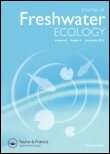
JOURNAL OF FRESHWATER ECOLOGY
Advancing knowledge of vital freshwater ecosystems.JOURNAL OF FRESHWATER ECOLOGY, published by Taylor & Francis Inc, is an esteemed source of research dedicated to advancing the understanding of freshwater ecosystems. Established in 1981, this Open Access journal has provided a platform for innovative studies and groundbreaking articles relevant to the fields of Aquatic Science and Ecology. With its HIndex reflecting a commitment to quality scholarship, the journal is currently classified in the Q3 category for both Aquatic Science and Ecology, Evolution, Behavior and Systematics, indicating its respectable impact within these disciplines. The journal ranks within the 45th percentile in Ecology and the 41st percentile in Aquatic Science on Scopus, highlighting its relevance to a global audience of researchers and practitioners. By facilitating unrestricted access to research findings since 2017, JOURNAL OF FRESHWATER ECOLOGY aims to enrich our understanding of freshwater systems and their conservation, making it an essential resource for those invested in ecological research and environmental sustainability.
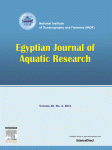
Egyptian Journal of Aquatic Research
Driving excellence in aquatic research and innovation.Welcome to the Egyptian Journal of Aquatic Research, a premier peer-reviewed academic journal published by ELSEVIER, dedicated to advancing the field of aquatic sciences. With a robust impact factor and recognition as a Q1 journal in key categories such as Aquatic Science and Ecology, this open access journal has established itself as a vital platform for disseminating high-quality research since its inception in 2012. The journal aims to provide comprehensive coverage of topics including ecology, evolutionary biology, and water science, making it a crucial resource for researchers, professionals, and students engaged in these dynamic fields. With Scopus rankings placing it in the top echelons of various categories, the Egyptian Journal of Aquatic Research fosters innovation, collaboration, and knowledge dissemination on a global scale, making it an indispensable asset for anyone invested in understanding and preserving aquatic systems.
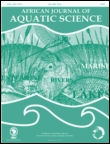
AFRICAN JOURNAL OF AQUATIC SCIENCE
Exploring the depths of biodiversity and conservation.AFRICAN JOURNAL OF AQUATIC SCIENCE, published by TAYLOR & FRANCIS LTD, is a premier scholarly journal dedicated to the field of aquatic science, ecology, and environmental management, playing a crucial role in advancing research and knowledge in these vital areas. With an impressive Q2 ranking in both Aquatic Science and Ecology, Evolution, Behavior and Systematics, the journal seeks to publish high-quality research encompassing a wide range of topics related to freshwater and marine ecosystems, including biodiversity, conservation strategies, and the impacts of climate change. Featuring a rich history of publication from 2000 to 2024, the journal not only embraces rigorous peer review but also aims to foster collaboration and dialogue among researchers, practitioners, and students interested in aquatic environments. Readers will find that the journal’s commitment to impactful scientific communication is reflected in its notable rankings within the Scopus database, making it an essential resource for those engaged in aquatic research and management.

Hidrobiologica
Bridging local insights with global aquatic challenges.Hidrobiologica is a pivotal academic journal dedicated to the field of aquatic sciences and ecology, published by UNIV AUTONOMA METROPOLITANA-IZTAPALAPA in Mexico. With a commitment to fostering research from diverse ecosystems, this journal encourages the dissemination of knowledge spanning aquatic environments, ecological interactions, and marine biodiversity. Although classified in the Q4 category across various relevant fields such as Aquatic Science and Oceanography, Hidrobiologica is focused on increasing visibility and engagement among scholars by providing a platform for innovative research that addresses contemporary ecological challenges. The journal's address reflects its deep-rooted commitment to local and regional aquatic research, yet it aims to resonate with a global audience. Researchers, professionals, and students alike will find value in the journal's scope, which spans from 2007 to 2024, making it a valuable resource for understanding advancements in aquatic studies. While not an open-access journal, it continues to be a significant contributor to the academic dialogue in aquatic sciences.

Freshwater Crayfish
Exploring the Depths of Crayfish EcologyFreshwater Crayfish, published by the International Association of Astacology, is a peer-reviewed journal dedicated to the comprehensive study of freshwater crayfish, encompassing their ecology, behavior, conservation, and management. With an ISSN of 2076-4324 and an E-ISSN of 2076-4332, this journal serves as an essential platform for researchers, professionals, and students in aquatic science, particularly within the fields of Ecology, Evolution, Behavior and Systematics and Aquatic Science, where it ranks notably in Scopus rankings. The journal has a consistent publication history since 2008, enhancing its relevance and contribution to the scientific community. While it operates under an open-access model, allowing for wide dissemination of research findings, it is particularly noted for its significant impact on advancing knowledge in the preservation and sustainable management of crayfish species. This makes Freshwater Crayfish a vital resource for those passionate about aquatic biodiversity and conservation.
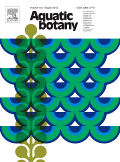
AQUATIC BOTANY
Exploring the intricate world of aquatic plants.Aquatic Botany, published by Elsevier, stands as an influential scholarly journal in the fields of Aquatic Science and Plant Science. Established in 1975, this esteemed journal has maintained a strong commitment to advancing our understanding of aquatic plant life, providing a platform for high-quality research that contributes to both ecological awareness and the sustainable management of aquatic ecosystems. With its impact factor reflecting a commendable ranking in the Scopus database—#169 in Plant Science and #95 in Aquatic Science—it is recognized for its valuable contributions to the scientific community, evidenced by its Q2 quartile ranking in both categories as of 2023. The journal does not currently offer open access, ensuring rigorous review and scholarly integrity while being accessible through institutional subscriptions. Set against the backdrop of the Netherlands, Aquatic Botany continues to be a vital resource for researchers, professionals, and students looking to explore the complex interactions between aquatic flora and their environment, aiming to inspire innovative ideas and practical solutions for aquatic conservation and management.
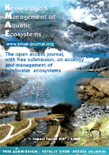
Knowledge and Management of Aquatic Ecosystems
Advancing Solutions for Sustainable Aquatic EcosystemsKnowledge and Management of Aquatic Ecosystems, published by EDP SCIENCES S A, is a premier open-access journal dedicated to the interdisciplinary study of aquatic ecosystems. With an ISSN of 1961-9502 and an impressive history since 1928, this journal serves as a vital resource for researchers and professionals in the fields of Ecology, Aquatic Science, Water Science and Technology, and Nature Conservation. The journal has consistently achieved high rankings, including a Q2 classification in multiple categories, which underscores its significant contribution to the evolving landscape of aquatic research. With access options that promote widespread dissemination of knowledge, Knowledge and Management of Aquatic Ecosystems aims to bridge gaps in research, policy, and practical applications, making it an invaluable asset for students, researchers, and policymakers aiming for impactful solutions in aquatic management and conservation.